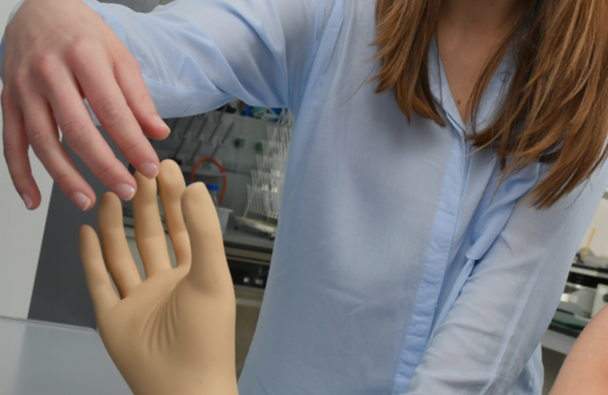What would hospitals be without ventilators, for example? Students enrolled in the Medical Engineering program are learning how to design medical devices for the future.

What do you think of when you think of medicine? Doctors? Nurses? They all do outstanding work. However, advances in modern medicine are also attributed to a second pillar: medical technology. The JKU’s Medical Engineering degree program kicked-off in 2019, focusing on how to turn modern scientific findings into medical advancements. The program combines medical education with engineering and mechatronics. The proportion of women is 51%. We spoke with some of the students.
How hard is the program?
It varies because each student has his or her own favorite subjects. But on the whole, the program is manageable. When it comes to the more technical subjects, those who graduated from HTL schools have it easier. Those who studied to take the entrance exam to study medicine or graduated in biology have better chances of passing the Faculty of Medicine exams.
What was your first semester's thesis?
A spirometer designed to not only measure a test subject’s lung capacity, but also the alcohol content from a breath sample.
Does it work?
Sure! After blowing into the mouthpiece, a sensor measures the pressure and volume of flowing air and calculates pressure variations in our 3D-printed case. Another sensor measures the alcohol content during the pressure measurement and the values are adjusted with the aid of a breathalyzer.
How is the student-faculty ratio and contact with professors?
Very good. If you have any questions, you can just send a short e-mail to the professors or stop by their offices.
What advice do you have for first-year students?
Keep up with the course materials and study constantly so that it doesn’t all pile up at the end of the semester. This way you don't get all stressed out at the end of the semester. But most importantly, take the medical examinations seriously and familiarize yourself with the basics of programming.
About the Students
Tülü Kazim: age 21, from Salzburg / Hobbies: watching TV series and running / is studying Medical Engineering because: "I graduated from an HTL school and had focused on health technology. I enjoyed studying medicine and medical technology the most so the decision to pursue this degree was an easy one."
Buchner Philipp: age 20, Salzburg region / Hobbies: working out, watching Formula 1 racing, and go-karting / is studying Medical Engineering because: "I am interested in the medical field and my engineering background at an HTL school made medical engineering the obvious choice."
Lindhuber Florian: age 20, from Mondsee / Hobbies: meeting up with friends and playing basketball / is studying Medical Engineering because: "I didn't pass the medical entrance exam but I really wanted to be involved in the medical field."
Markincovic Petar: age 24, from Linz / Hobbies: computer games / is studying medical engineering because: "I didn't pass the medical entrance exam."
 Go to JKU Homepage
Go to JKU Homepage








